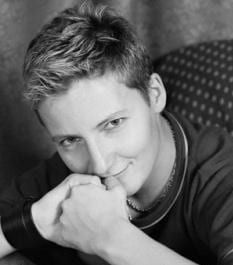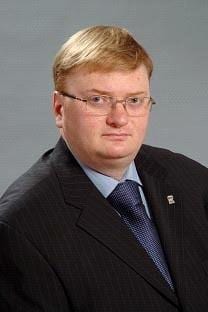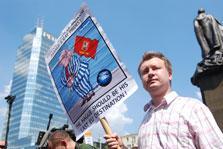
St Petersburg's Polina Savchenko says the propaganda laws that legalize discrimination against gays are not necessarily bad things. "Now it's been legitimized, we have very concrete things to fight against, and we have concrete ways of doing it." Credit: Courtesy: Nikolai Alexeyev

The main architect of St Petersburg's propaganda law, assembly member Vitaly Milonov. Nikolai Alexeyev is calling for politicians like Milonov, who promote anti-gay legislation, to be put on an international travel blacklist. Credit: Courtesy: Nikolai Alexeyev
Ryazan. Arkhangelsk. Kostroma. St Petersburg. Novosibirsk. Five cities that are crucibles in what gay rights activist Nikolai Alexeyev dubs a second wave of debate about homosexuality in Russia.
Four out of five have passed so-called “gay propaganda” laws that ban promotion of homosexuality among minors. Novosibirsk, Russia’s third-largest city, successfully piloted similar legislation through its first reading, but its measures have yet to be fully implemented.
For Alexeyev, the first wave of public discussion arose seven years ago when he and fellow activists pushed to stage Moscow Pride, which the city’s former mayor Yuri Luzhkov labelled “satanic” and banned five years in a row.
“Moscow Pride would never get such publicity if there was no mayor Yuri Luzhkov who did everything to attract maximum attention,” Alexeyev contends. “He talked about gays as perverts, as weapons of Western mass destruction, as people responsible for AIDS epidemic. He is the one who used this topic everywhere.”
Then came the “marvelous idea of these laws of propaganda of homosexuality,” quips Alexeyev.
He characterizes the rise of these laws as a case of “one step backward, two steps forward.” Backward because it sheds light on the “stupid” thinking of those who initiate such laws and provides a benchmark on where the wider society stands on the question of homosexuality. “In the majority of polls, Russians are absolutely supporting these bills,” Alexeyev notes. He says the last federal poll showed, however, that only eight percent of those surveyed said they ever saw propaganda of homosexuality. “People want to ban something they never saw. It’s ridiculous,” he concludes.
Polina Savchenko, the head of the grassroots St Petersburg organization Coming Out, also cites a 2010 poll showing the depth and breadth of homophobia across the country: 74 percent of Russians think gays are mentally defective or morally depraved; 39 percent think they should be isolated from society, while four percent think they should be killed.
“It’s a very bad place to start,” observes Savchenko, who says part of Coming Out’s work is to change public opinion about gays through education.
“There’s always a message for people as to why we’re coming out into the street — tables, flyers, signs that give people some kind of information about homosexuality,” she adds. “For Russian people, there is no other source of information that is objective and science-based. We are that source.”
But both Alexeyev and Savchenko agree that the gay propaganda laws — and the protests, subsequent arrests and media coverage they provoke — are proving to be a huge boon to the Russian gay rights movement.
“In Russia, the biggest promoters of LGBT rights and the biggest promoters of homosexuality are people who are talking against it,” Alexeyev says.
For her part, Savchenko feels the sanction that propaganda measures have now given various cities to legally discriminate against queers — despite the decriminalization of homosexuality in 1993 — is not necessarily a bad thing.
“Before there was no official discrimination against gay people, but unofficial discrimination was happening all the time. It’s hard to fight against something that’s not defined,” Savchenko explains. “Now it’s been legitimized by the state, we have very concrete things to fight against, and we have concrete ways of doing it. One would be litigation, of course,” she says.
The litigation route is one Alexeyev has taken full advantage of in his years of activism, whether it’s appealing the successive Moscow Pride bans to the European Court of Human Rights or challenging the propaganda laws in the local courts and, if necessary, internationally.
In October 2010, the European Court of Human Rights ruled that prohibiting Moscow Pride is discriminatory and an illegal violation of the right to peaceful protest and freedom of assembly, contrary to the European Convention on Human Rights to which Russia is a signatory. But that decision didn’t stop Moscow’s current mayor, Sergei Sobyanin, from banning Pride in 2011, the sixth consecutive time it was denied a permit.
Alexeyev intends to submit yet another permit application to city authorities to stage Pride for a seventh time on May 27.
Meanwhile, the outcome of the challenges to the propaganda laws has been mixed, or a question of wait-and-see.
Alexeyev and fellow activists have strategically targeted government buildings and children’s libraries in Ryazan, Arkhangelsk, Kostroma and St Petersburg with placard protests, pushing the police and courts to invoke the measures he and other activists describe as obscure, with terms like propaganda lacking a specific definition.
“It all started with Ryazan in 2006, and our [picketing] actions in 2009 against the Ryazan laws — which at that time no one really cared about or talked about,” he recalls. “The jurisprudence in Ryazan is that they consider the pickets in front of the library there as a violation of the law and as propaganda of homosexuality. It’s only because of that that [the Ryazan] case is now pending at the European Court of Human Rights and the UN Human Rights Committee,” he adds.
Alexeyev, who is a lawyer, says the UN Committee is scheduled to hear the case in July. “That will be the first international legal response to this legislation in Russia. It will become a basis for any further decisions of the European Court or in Russia. That will be a very important legal step,” he says. “If we didn’t do this in 2009, we would be nowhere now challenging these laws on the international level.”
After Arkhangelsk passed its own version of the propaganda law in 2011, there were further picketing actions in front of that city’s state institutions and the children’s library. All the public events were banned under the law, and three activists, including Alexeyev, were charged with breaching the law in January. “The court confirmed that it was propaganda, and the appeal court also confirmed the decision, so this case of Arkhangelsk is now ready for the European Court [of Human Rights], where we will apply in the next couple of weeks,” he says.
While activists were again detained and charged under similar legislation for similar picketing actions in Kostroma, the court there threw out the charges, ruling that they weren’t promoting “propaganda of homosexuality,” even though they were in the vicinity of a children’s library.
“It was the first time the judge sided with us,” Alexeyev points out. “She made direct reference to the European Court decision in the case of Moscow Pride, in which she said that the promotion of public discussion of homosexuality in general cannot be considered as doing harm to minors.
“That’s probably the most progressive decision that I ever saw on this issue in Russia,” he adds.
Alexeyev was not so lucky in St Petersburg on May 4 when he was convicted under its propaganda laws for holding up a sign outside the city hall that read, in part, “Homosexuality is not perverted.” His conviction came mere days after 17 queer activists and their allies were arrested but weren’t charged under the same law for carrying rainbow banners or wearing rainbow insignia at a May Day civil rights march.
Alexeyev says he plans to appeal the ruling and will also seek redress at the European Court of Human Rights if necessary.
The existence and use of the anti-gay laws has ensured that gays and their human rights push are virtually front and centre of Russia’s daily media cycle. As far as Alexeyev is concerned the more coverage there is, the better.
“The quality of the discussions changed enormously from what we saw in 2005/2006, when we started, and the discussions of today,” he says. “We see many, many articles of quite positive or neutral nature, and we see the discussions on TV in which gays are already given equal part in the discussion and equal right to say what they want to say.
“It can seem strange, but I think ironically, the homophobes managed to get the opposite effect from the propaganda initiatives.”
But Savchenko says despite the more sympathetic and balanced media coverage, public opinion about homosexuality is not coming round quickly and has actually taken a turn for the worse. She attributes that to the general public’s lack of understanding.
“I think it’s normal that in the initial stages people don’t immediately have a positive reaction,” Savchenko says. “We think that it is going to get worse before it gets better. But it’s still positive that they’re hearing gay people exist, that they have rights, that there is discrimination against them that is being legitimized now by the state, so it’s very important for this issue to become visible.”
What Alexeyev, Savchenko and other activists are waiting to see is whether a federal version of the propaganda laws will be implemented across the country.
Alexeyev says reaction to the federal bill brought by Novosibirsk deputies has been cautious. “[The bill] is basically going to be the face of Russia, and not everyone in the federal authorities and the Kremlin want to have this face.”
Savchenko points out that both the head of the presidential human rights council and the federal ombudsman for human rights have criticized the bill for its legal ambiguity — not to mention a few well-known journalists. “Basically, a wave of public opinion of influential people in Russia have been speaking out against this law,” she says. “This can actually have an effect on how politicians are going to view it in the State Duma.”
At the federal level, people are “just sitting and watching to look at this fight from the top, and they’re just seeing who will win. But they know very well who will win,” Alexeyev says.
In the meantime, what would bring a halt to the city-by-city institution of the propaganda laws is putting lower-level politicians, like St Petersburg assembly member Vitaly Milonov, on an international travel blacklist, Alexeyev suggests. Milonov was the principal drafter of the city’s anti-gay bill passed in February.
“When you block them from leaving their country and going to civilized countries, this is something they are scared of,” Alexeyev adds.
“All other people who have similar ideas, making their career out of hating LGBT people, who try to promote these laws, will think 10 times before doing this.
“It’s an effective strategy,” he concludes.


 Why you can trust Xtra
Why you can trust Xtra


